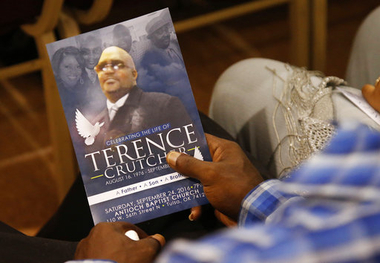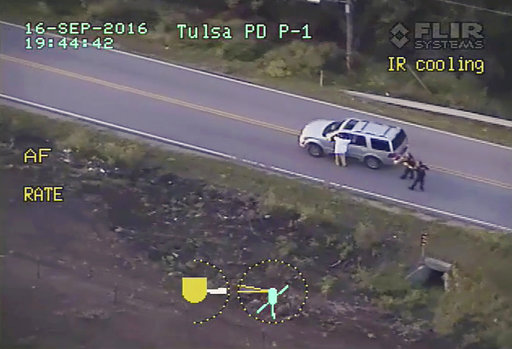Jurors will be asked if Tulsa cop went too far with shooting

TULSA, Okla. (AP) — Jurors hearing the manslaughter case against a white Oklahoma police officer accused of fatally shooting an unarmed black man last year will be asked to decide whether she used appropriate force — a question that's been put to juries around the U.S. in other similar trials.
Tulsa officer Betty Jo Shelby is accused of overreacting when she shot 40-year-old Terence Crutcher in September. Prosecutors say Crutcher wasn't armed or combative when Shelby approached him on a street after his SUV broke down and that he obeyed Shelby's commands to raise his hands. Shelby's attorneys say she feared for her life, believing he was reaching into his vehicle for a gun.
Crutcher is among at least 20 black people in the U.S. who have died after police encounters in the past several years. The killings have galvanized the Black Lives Matter movement, which called on citizens to demand more accountability from law enforcement.
Shelby, who has been on unpaid leave, faces four years to life in prison if convicted. Her trial starts Monday.
Some key elements of the case:
___
THE KILLING
Shelby came upon Crutcher's stalled SUV while on her way to a domestic violence call. Police video shows Crutcher walking away from Shelby toward his vehicle with hands above his head. The footage doesn't offer a clear view of when Shelby shot Crutcher.
Her attorneys say that in the two minutes before cameras began recording the encounter, Shelby repeatedly ordered Crutcher to stop walking away from her and get on the ground. Shelby also said she feared Crutcher was under the influence of PCP, a powerful hallucinogenic known as Angel Dust that makes users erratic, unpredictable and combative.
"Her options went to zero when he turned and put his hand in the car," defense attorney Shannon McMurray said.
An autopsy showed PCP was in Crutcher's system, and police said they found a vial of it in his SUV.
Crutcher's family said police attempted to "demonize" Crutcher over the drug possession to deflect attention from the fact officers didn't find a gun inside his SUV.

Terence Crutcher, left, is pursued by police officers before being shot and killed by one of the officers in Tulsa, Okla., Sept. 16, 2016.
"His hands were up, there was daylight, everyone can clearly see that he had no weapon in his hand whatsoever," Crutcher's twin sister, Tiffany Crutcher, told The Associated Press in September.
___
TWO INVESTIGATIONS, ONE CHARGE
Tulsa County District Attorney Steve Kunzweiler charged Shelby with first-degree manslaughter six days after the shooting. An affidavit accused her of "becoming emotionally involved to the point that she overreacted."
McMurray argued that prosecutors rushed to charge Shelby for political reasons, fearing civil unrest like the angry street protests that erupted in Charlotte, North Carolina, after the fatal shooting of 43-year-old Keith Lamont Scott four days after Crutcher was killed.
The Justice Department also opened a civil rights investigation into Crutcher's death. Loretta Radford, the acting U.S. attorney for the Northern District of Oklahoma, declined to comment on the case.
___
PARTNER BACKS SHELBY
Crutcher's backing partner, Tyler Turnbough, deployed his stun gun on Crutcher even as Shelby was firing her handgun, and prosecutors have questioned why Shelby didn't do the same.
But Turnbough told the nonprofit National Center for Police Defense that Shelby followed protocol, especially if she suspected Crutcher was under the influence of a mind-altering drug.
"Officer Shelby's reaction was appropriate and necessary," he told the nonprofit, which provides medical and legal aid to officers in similar cases. "There is no way of knowing what he was reaching for and to take a chance could be deadly."
The nonprofit estimated last month that it had raised about $100,000 for Shelby's cost-of-living expenses.
___
A 'CATCH-22'
How Shelby and Turnbough each assessed the situation illustrates the dilemma officers face when "someone can go from unarmed to armed" in seconds, said Louis Laguna, a professor of forensic psychology at Lebanon Valley College in Annville, Pennsylvania.
"It's a Catch-22 really, because it's almost impossible to kind of go back and Monday morning quarterback it," said Laguna, a former police officer.
A judge in April reprimanded Shelby and her attorneys after she talked about her case on national TV.
Shelby, 43, told CBS' "60 Minutes" that Crutcher appeared to reach inside his SUV for a weapon and ignored her commands to stop.
"I say with a louder, more intense voice, 'Stop. Stop! Stop!' And he didn't. And that's when I took aim," she said.
_
Copyright 2017 The Gayly - 5/7/2017 @ 10:27 a.m. CDT





